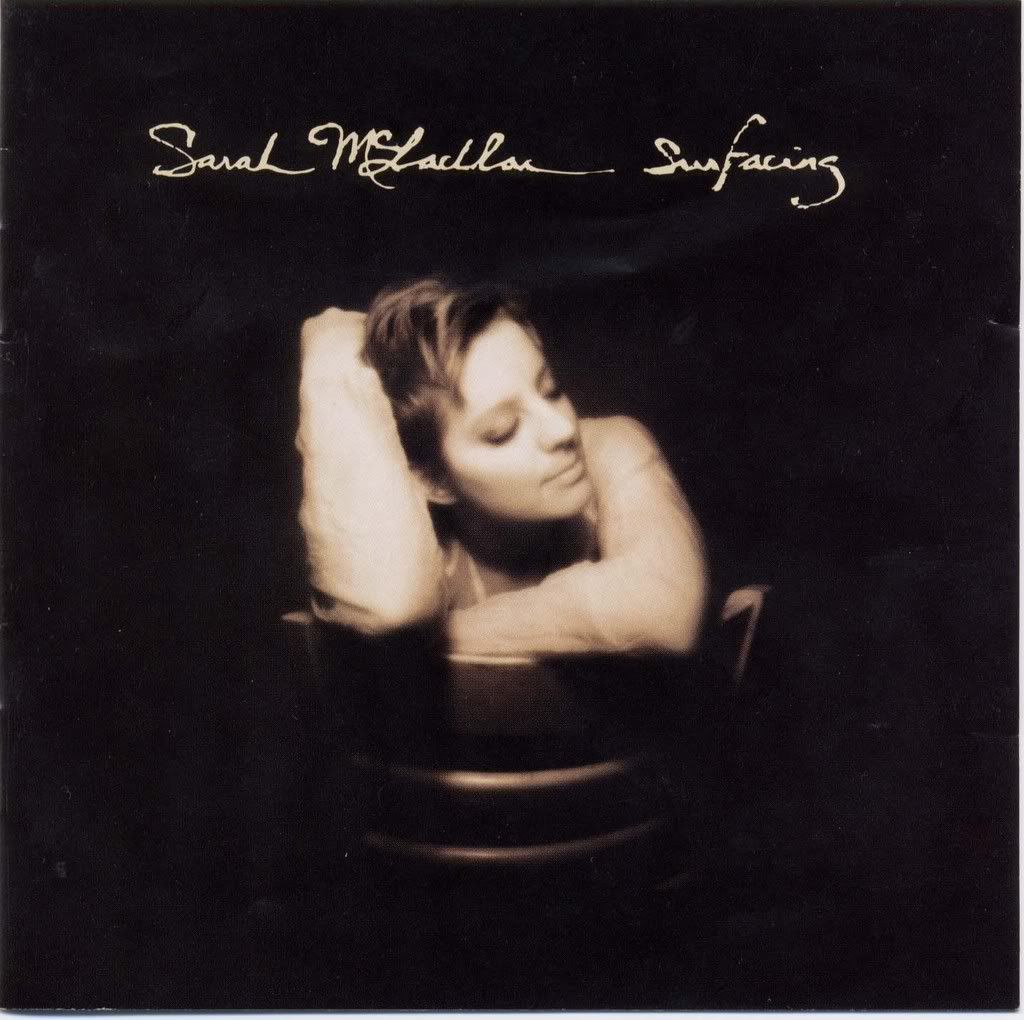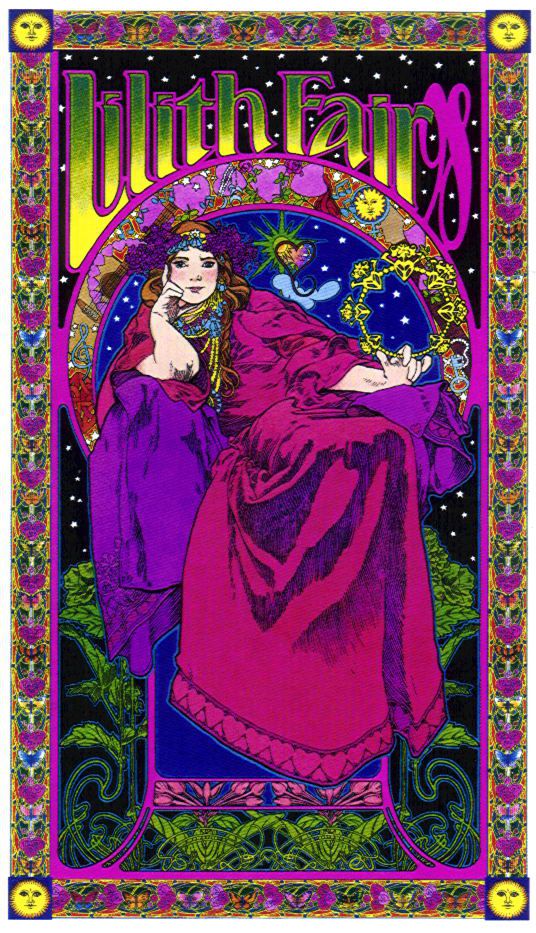Gordon Lightfoot Book, Music and More!
Feature Article: Sarah McLachlan - Front and Centre Stage
 Sarah McLachlan was lounging in her air-conditioned trailer, exhausted but exhilarated after a day spent fielding media questions and a night spent singing, strumming and strutting on stage. Mountain View, Calif., an hour's drive south of San Francisco, was the third stop on the Lilith Fair tour, the all-women's rock festival she conceived that features top female musicians and a travelling New Age caravan of booths and boutiques (see below). McLachlan was settling into the rhythm of a schedule that has her both headlining the 35-stop tour and acting as its chief spokeswoman. Kicking off her sandals and curling up on a couch, the 29-year-old Canadian performer reflected on the high profile that Lilith has suddenly brought her. "I love how powerful this whole thing makes me feel," she told Maclean's. "Not a selfish power," she hastened to add, "but a strength that's coming from everyone around me. It's a good kind of feeling and a good kind of power."
Sarah McLachlan was lounging in her air-conditioned trailer, exhausted but exhilarated after a day spent fielding media questions and a night spent singing, strumming and strutting on stage. Mountain View, Calif., an hour's drive south of San Francisco, was the third stop on the Lilith Fair tour, the all-women's rock festival she conceived that features top female musicians and a travelling New Age caravan of booths and boutiques (see below). McLachlan was settling into the rhythm of a schedule that has her both headlining the 35-stop tour and acting as its chief spokeswoman. Kicking off her sandals and curling up on a couch, the 29-year-old Canadian performer reflected on the high profile that Lilith has suddenly brought her. "I love how powerful this whole thing makes me feel," she told Maclean's. "Not a selfish power," she hastened to add, "but a strength that's coming from everyone around me. It's a good kind of feeling and a good kind of power."
McLachlan-rightful heir to Joni Mitchell's title as Canada's pre-eminent female singer-songwriter-has every reason to celebrate. Already, Lilith has blossomed into the summer's hottest music festival, upstaging and outselling male-dominated events like Lollapalooza. And it has propelled the Halifax native from a comfortable niche in alternative music to pop's centre stage, alongside such Lilith stars as Tracy Chapman, Jewel and Joan Osborne. McLachlan's initial U.S. breakthrough actually came last year, when her single, "Possession," rebounded to keep her 1993 album, Fumbling Towards Ecstasy on the Billboard charts. Its sales stand at more than three million copies and counting. But now, with the combined force of Lilith Fair and a chart-climbing new single, Building a Mystery, taken from her fourth album, Surfacing, McLachlan's star is ascending even higher. "Sarah's ready for all of this," said MuchMusic veejay Terry David Mulligan, a longtime observer of her career. "She's really grown into it."
In fact, McLachlan is a 10-year veteran of the music world, a down-to-earth diva whose physical transformations and musical maturity have gradually unfolded on video screens across the continent. Gone is the waiflike girl whose breathy vocals and sometimes precious songs once made her appear almost too vulnerable. Gone, too, are the curly, shoulder-length tresses that defined her look through much of the 1990s. Today, the Vancouver-based McLachlan, who is married to her Calgary-raised drummer, Ashwin Sood, wears her hair cropped short and sings with an emotional depth that makes her seem wise beyond her years. Meanwhile, she has become a powerful role model for young women across North America. And now she's talking about having kids.
The youngest and only daughter of three children born in Halifax to an American marine biologist, Jack McLachlan, and his U.S.-born wife, Dorice, McLachlan grew up in a strict household where television was limited to half an hour a day. At 7, her parents enrolled her in a music conservatory for classical training, first in guitar, then piano and voice. She found the world of classical music stifling and, later, came to resent her parents' ban on jeans, makeup and boyfriends. Still, she credits her mother for turning her on to the folk sounds of Joan Baez, Simon and Garfunkel, and Cat Stevens. "I listened to those records for 10 or 12 years," recalled McLachlan. "That's where my biggest influences lie." By the age of 17, a rebellious McLachlan was a skateboard punk singing in a new wave band called The October Game. When the group opened for the Vancouver band Moev one night at a Dalhousie University hangout, McLachlan's fate changed forever. Moev's Mark Jowett, also an owner of the Nettwerk record label, remembers being blown away by what he heard and saw. "Here was this quasi-goofy teenage girl, still wearing braces on her teeth, singing a Blondie cover," said Jowett, now Nettwerk's vice-president of international publishing. "But she had this warmth, and a voice that lured people right in. She really captivated me."
By the age of 17, a rebellious McLachlan was a skateboard punk singing in a new wave band called The October Game. When the group opened for the Vancouver band Moev one night at a Dalhousie University hangout, McLachlan's fate changed forever. Moev's Mark Jowett, also an owner of the Nettwerk record label, remembers being blown away by what he heard and saw. "Here was this quasi-goofy teenage girl, still wearing braces on her teeth, singing a Blondie cover," said Jowett, now Nettwerk's vice-president of international publishing. "But she had this warmth, and a voice that lured people right in. She really captivated me."
Jowett's instincts were right on target. It would take another two years before McLachlan's parents would permit her to take up Nettwerk's offer of a record deal and a base in Vancouver. "My parents were afraid I would snort my life away with cocaine," she recalls with a laugh. (In the interim, she attended the Nova Scotia College of Art and Design, where she specialized in jewelry and textiles.) But even her parents were pleased when her 1988 debut album, Touch, earned ecstatic reviews and a devoted, almost cultlike following. Her subsequent albums, Solace (1991) and Fumbling Towards Ecstasy (1993), were even better and increased her fan appeal. Today, a 2000-strong international fan club, whose members call themselves "fumblers," charts McLachlan's progress in newsletters, on Web sites and in endless Internet chat groups.
There were plenty of fumblers at the Shoreline Amphitheatre in Mountain View. Like the Grateful Dead "Deadheads," the most devoted of them follow their idol from venue to venue. But McLachlan seems unperturbed by the presence of those camp followers, even though past experience might give her cause to fear such intense attention. For three years, McLachlan was stalked by an obsessed fan who followed her to Vancouver from his Ottawa home. Eventually, after receiving hundreds of letters from computer programmer Uwe Vandrei, McLachlan obtained a restraining order against him. She wrote about the experience in her hit song, Possession, prompting a bizarre lawsuit from Vandrei claiming "breach of confidence" because McLachlan had used his correspondence as the basis for the song. Nothing came of the suit and Vandrei subsequently committed suicide in December, 1994.
Today, McLachlan is still grappling with the price of celebrity, although she says she can now distinguish between fans and fanatics. "I get great letters now, everybody prefacing them with `I'm not one of those psycho fans but . . . ,' " the singer reflected, sipping a glass of spring water. "I feel really happy that I talked about all that so much, because it put a spotlight on something that obviously needed to be looked at."
But other issues connected to her growing fame keep arising. Two former associates, who claim they were never paid songwriting royalties for their work on Touch, have launched a lawsuit against Nettwerk, McLachlan's label. And the Vancouver record company has rattled its own legal sabres over an unauthorized biography currently in the works by Toronto-based writer Judith Fitzgerald. "It's a strange path, this celebrity thing," McLachlan admitted. "Becoming famous and losing your privacy can mean losing your self-which is something I've always struggled with." She added: "After two and a half years on the road with Fumbling, I had built up so many walls that I looked in the mirror one day and said, `I don't know who the hell I am any more.' "
But back home after the tour ended in December, 1995, McLachlan discovered that the last thing she wanted to do was address those inner conflicts. "Work on myself?" she recalled asking rhetorically. "Why don't we go have a coffee instead. Give me distractions!" The biggest distraction she could think of was promising to write another album's worth of songs-a commitment that led to a serious case of writer's block. "The last thing in the world that I needed to do then was write," she says. "But I was trying to please everybody, everybody but myself."
McLachlan spent eight months in Quebec's Laurentian Mountains-at the Morin-Heights chalet of her longtime producer Pierre Marchand-trying to compose new material. After she had suffered too many sleepless nights and anxiety attacks that at times left her unable to eat, Marchand introduced McLachlan to a massage therapist who specialized in a practice called polarity therapy. "It involves getting all your energy and emotions unblocked," the singer explained. "In the end, she taught me to really feel whatever it was I was feeling. She'd tell me, `Here's this thing that needs to come out-don't deny it.' " What eventually came out were the 10 songs on Surfacing, her most powerful recording to date. Rich in revelations about her search for personal enlightenment, the album bristles with an emotional intensity rare in pop music. On "Angel," her tender soprano and heartfelt lyrics make a ballad about a heroin addict sound like a hymn. And on the lush, pulsing "Sweet Surrender," McLachlan sings about abandoning herself to romance: "You strip away the ugliness that surrounds me/The life I've left behind me/is a cold, cold room." But it is "Building a Mystery," a darkly compelling number about artifice and identity, that best reflects her maturing strength as a composer.
What eventually came out were the 10 songs on Surfacing, her most powerful recording to date. Rich in revelations about her search for personal enlightenment, the album bristles with an emotional intensity rare in pop music. On "Angel," her tender soprano and heartfelt lyrics make a ballad about a heroin addict sound like a hymn. And on the lush, pulsing "Sweet Surrender," McLachlan sings about abandoning herself to romance: "You strip away the ugliness that surrounds me/The life I've left behind me/is a cold, cold room." But it is "Building a Mystery," a darkly compelling number about artifice and identity, that best reflects her maturing strength as a composer.
And "Mystery" is the song that brought the capacity crowd in Mountain View to its feet. As a performer, McLachlan can project huge amounts of emotion and energy, while at the same time her two-and-a-half octave vocal range and subtle body movements draw listeners in to the intimate world of her songs. Onstage, dressed in leather pants and with a guitar slung across her patterned blouse, McLachlan let loose with her best-known songs, including "Hold On," inspired by the horrors of poverty and child prostitution she witnessed during a trip to Thailand and Cambodia, and "Path of Thorns," about the loss of a loved one. Many of her songs, old and new, revel in melancholy, and McLachlan has admitted she wishes she could write happier pieces. She saved her one and only lighthearted tune-the playful love song, "Ice Cream"-for her encore.
Perhaps marriage and the anticipation of motherhood will lighten the dark strains in her work. Certainly, her relationship with Sood seems happy. Between shows, McLachlan and Sood relaxed offstage, throwing a Frisbee to their Labrador retriever, Rex, and shooting a basketball with band members. Later, the two had dinner together in the outdoor café set up for Lilith's performers. McLachlan credits Sood with providing stability amid the stress of Lilith and its attendant pressures. "I'm pretty needy and he's a huge support," she says. "I don't think I could do all this if he wasn't out here with me."
The couple eloped last February to Negril, Jamaica. There, at a beachfront resort, they tied the knot in a quick and simple ceremony. "Half an hour before we got married we were naked in the ocean," says Sood. "And half an hour later we were naked and back in the ocean. It couldn't have been better." When the couple returned to Vancouver, they held a reception for friends and family, introducing the in-laws to one another.
McLachlan and Sood live in a comfortable, renovated house in Vancouver's Dunbar neighborhood, complete with Jacuzzi and a recording studio. But the two will have little time to enjoy it this year. After completing Lilith Fair's 35 bookings, McLachlan and her band will set off on their own North American tour in the fall. After that, McLachlan insists, motherhood is on the horizon. "We're going to try and have a baby," she announced during a recent MuchMusic special. "I'm almost 30, you know, the clock's ticking big time."
Meanwhile, McLachlan is getting used to her position as Lilith's den mother and as a role model to young women. "I never used to be comfortable with that," she says, running her fingers through her auburn hair, "because I wasn't very comfortable with myself. I didn't like parts of myself. Girls would tell me how much I meant to them and I'd think, `Don't look up to me-I'm more messed up than anybody I know.' But I'm fine with it now." She added, leaning back and smiling a big grin: "I'm feeling really strong at the moment-ready for anything the world throws at me."
_______________________________________________________________________________________________________________________
Lilith Fair - Songs of the Sirens
They read tarot cards on the grass in the afternoon sun and danced under the moon to the sounds of Tracy Chapman. And before they left the Shoreline Amphitheatre in Mountain View, Calif., a number of women-faced with lengthy lineups at the ladies' rooms-took matters into their own hands and simply went into the men's. Welcome to Lilith Fair, an event organized and headlined by Canada's Sarah McLachlan, that is changing the nature of summer rock festivals. Dubbed everything from "Chickapalooza" to "Estrofest," Lilith Fair offers a kinder, gentler alternative to the aggressive mosh-pit scenes of male-dominated events like H.O.R.D.E. and Lollapalooza. At the Shoreline earlier this month, the sold-out crowd of 22,000-four girls to every boy-enjoyed eight hours of music by 10 female acts that ranged in styles from jazz and blues to alternative rock and pop-folk. Whether it was the precise folky lyrics of Suzanne Vega's "Luka," the emotive, soaring vocals of Paula Cole's "Me" or the funky acoustic pop of Jewel's "Who Will Save Your Soul," Lilith showcased thoughtful, introspective songs. Later, when Chapman sang her anthem, "Talkin' 'Bout a Revolution," it seemed to underscore Lilith's social significance. Said Vega: "I feel like I'm taking part in something historic, something that's never really been done before." In fact, Lilith Fair continues a tradition that began in the 1970s with women's music festivals featuring the likes of folksingers Holly Near and Ronnie Gilbert. But those events were small, even quaint, by comparison-socially conscious, Birkenstocked gatherings that had little commercial impact within the music industry. By contrast, Lilith Fair-named after Adam's rebellious first wife-is an economic force to be reckoned with. The first four dates of its 35-city North American tour are sold out, in 10,000- to 22,000-seat venues, making Lilith already this summer's biggest ticket. By the time the all-woman tour rolls into Canada next month (playing Toronto on Aug. 15 to 16, Montreal on Aug. 17, Calgary on Aug. 22, and winding up in McLachlan's home town of Vancouver on Aug. 24), a rotating roster of 51 acts will have given nearly half a million concert-goers an antidote to the angry messages of testosterone-fuelled rock.
In fact, Lilith Fair continues a tradition that began in the 1970s with women's music festivals featuring the likes of folksingers Holly Near and Ronnie Gilbert. But those events were small, even quaint, by comparison-socially conscious, Birkenstocked gatherings that had little commercial impact within the music industry. By contrast, Lilith Fair-named after Adam's rebellious first wife-is an economic force to be reckoned with. The first four dates of its 35-city North American tour are sold out, in 10,000- to 22,000-seat venues, making Lilith already this summer's biggest ticket. By the time the all-woman tour rolls into Canada next month (playing Toronto on Aug. 15 to 16, Montreal on Aug. 17, Calgary on Aug. 22, and winding up in McLachlan's home town of Vancouver on Aug. 24), a rotating roster of 51 acts will have given nearly half a million concert-goers an antidote to the angry messages of testosterone-fuelled rock.
Ironically, it was the raging, emotional blasts of Alanis Morissette that paved the way for Lilith's more hopeful brand of fem-pop. Ever since Morissette's Jagged Little Pill album hit sales of 15 million copies, the music industry has begun waking up to the commercial potential of singers like Jewel, Cole and McLachlan. Still, Terry McBride, McLachlan's Vancouver-based manager and a partner in Lilith, remembers encountering resistance to the idea of an all-woman tour when he began booking venues last September. "Most concert promoters are guys in their 40s and 50s," says McBride, "and some didn't think an all-woman tour offered enough diversity." According to Vega, who was around during pop music's earlier flirtation with female musicians in the 1980s, the same attitude prevails at many radio stations. "A lot of programmers are older men who think of women as a `type' of music," she says. "They don't see that women play many different styles."
That diversity comes through loud and clear in Lilith's lineup, especially on the smaller, secondary stages that feature up-and-coming talent. McLachlan and McBride also show a commitment to Canadian artists. Montreal's Lhasa, an expatriate American of Mexican extraction, may well be Lilith's most exotic addition, blending Hispanic, gypsy and Parisian café music like a globe-hopping Edith Piaf. Meanwhile, Dayna Manning of Stratford, Ont., only 18 and still in braces, has a spirited, confident debut album of modern folk, Volume 1, out on EMI. Mudgirl, led by Vancouver singer Kim Bingham, leavens crunching guitars and slamming drums with a sunny, buoyant chorus on songs like the rocking "This Day." And Tara MacLean, also of Vancouver, sings rich, moody ballads for the same record label, Nettwerk, that has fostered McLachlan.
But Lilith's most singular new Canadian talent is Vancouver's Kinnie Starr. Combining hip-hop beats, choppy rhythm guitar and provocative rap, Starr wowed the crowd at the Shoreline with a solo set. Relaxing backstage after her performance, Starr was enthusiastic about Lilith's feminine focus. "It's nice to be around other female players to see what they're doing, what equipment they use and just to talk," she said. "When I go into a recording studio and it's only men, I feel intimidated. Here, I feel totally safe and confident."
That sense of community is exactly what McLachlan had in mind when she conceived Lilith Fair last summer, with a successful trial tour of four cities. At the same time, with corporate sponsors who donated money to charities ranging from an AIDS organization to a rape and incest hotline, Lilith is making a highly visible statement about its organizers' social concerns. But McLachlan does not see her baby remaining a girls-only club for long, and says she wants to broaden it in future to include male singer-songwriters. "There are a lot of great men out there like [Toronto musician] Ron Sexsmith, who maybe aren't getting all the recognition they deserve," she says. "I'd like to bring them into the fold and spread it around."
Maclean's July 28th 1997
By accepting you will be accessing a service provided by a third-party external to https://www.nicholasjennings.com/



